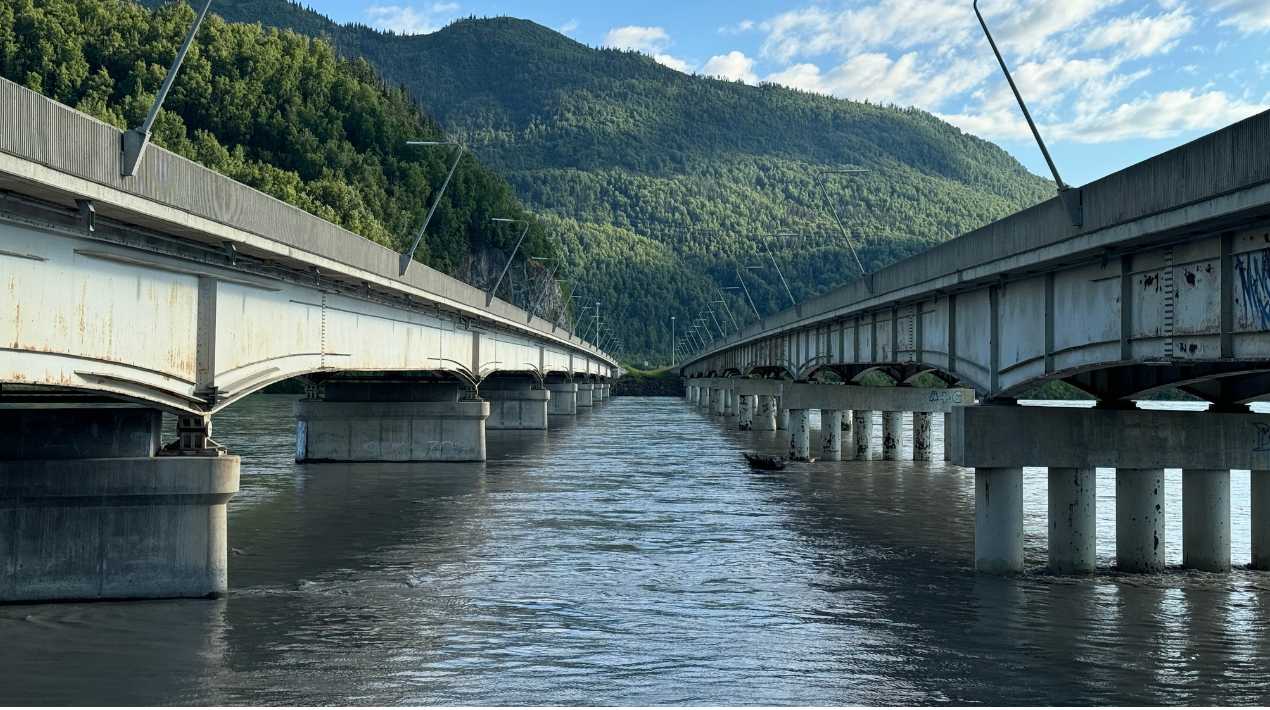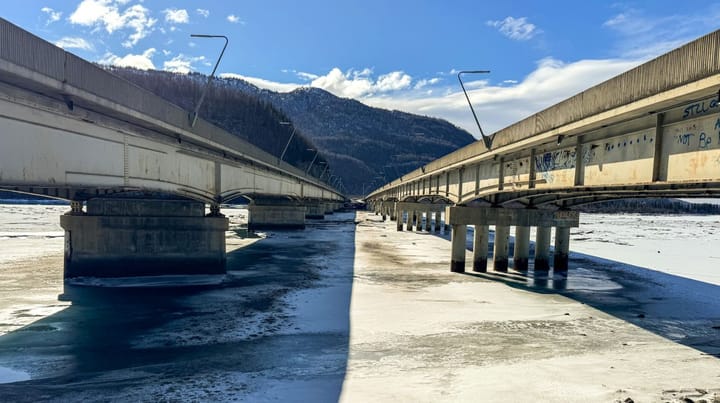Glenn Highway bridge overhauls delayed until 2025 as officials source traffic solution
A multimillion-dollar barrier-moving machine new to the state will be used to manage which direction gets the most traffic lanes.

What you need to know:
- A major overhaul of the Knik River bridges on the Glenn Highway has been delayed until summer 2025 to allow time for procuring a barrier-moving machine that officials say will help reduce traffic backups caused by the construction.
- Construction will require each span to be closed completely, with all traffic rerouted into three lanes on the open section. The barrier mover, also known as a zipper machine, will allow workers to quickly change which direction of traffic is assigned two lanes.
- In the meantime, crews will make minor surface and approach repairs to both bridge spans this winter.
PALMER – Major work to overhaul a pair of deeply rutted highway bridges that span the Knik River south of Palmer is delayed until next summer, officials said, partly to give the contractor time to procure a multimillion-dollar barrier-moving machine used to decrease construction-related traffic delays. The machine will be the first of its kind in the state.
The bridges, located between Mile 30 and 31 of the Glenn Highway, see thousands of vehicles daily and are known for their challenging conditions, especially in the winter. In late January, they were the site of a 37-vehicle collision that shut down the highway for hours and caused at least 13 injuries as frigid ice fog severely reduced visibility in the area. Since 2018, there have been about 90 traffic accidents in the miles on or near the bridge, according to Alaska State Trooper data.
Work was originally slated to start this summer.
Rather than leave the sections as-is until the overhaul project starts, crews this year will instead make minor surface and approach repairs on both the southbound and northbound spans of the Knik River Bridge on the Glenn Highway to smooth the worn surface, state transportation officials said. Those repairs will be completed before snow flies in the fall, with any ongoing construction paused in late August for the Alaska State Fair, they said.
The upcoming project, which is now expected to begin next summer and last through 2026, will completely replace the surface on both bridge spans.
Mat-Su Sentinel thanks its sponsors. Become one.
Each section will be closed for at least a month during the overhaul project, officials said. During the closures, all traffic will be diverted to a single span that will be reconfigured to hold three narrow lanes instead of the current two, they said. A movable concrete barrier separating southbound and northbound traffic will be shifted in response to peak traffic flows by a barrier-moving "zipper machine" new to Alaska, they said.
For example, during the morning commute, southbound traffic will have a double lane as drivers head into Anchorage, officials said, with the double lane reassigned to northbound traffic in the late afternoon.
The barrier machine is a common tool in highway work zones across the U.S., said Jason Lamoreaux, construction manager for the project, but it has not previously been used in the state. Unlike work done manually by road crews, which can require traffic to come to a complete stop, the machine works while vehicles are moving through the area, officials said. It moves the barriers at speeds between five and 20 miles per hour, according to contract documents.
Rather than spend millions to add the machine to its fleet, state officials are instead requiring the project's contractor to procure and bring it into the state, Lamoreaux said. The machine represents the single largest cost of the project, with a price tag between $3 million and $6 million, according to contract bid documents.
The federally funded project is expected to cost between $10 million and $20 million, Lamoreaux said. Bids for the project closed late last month, with three construction companies submitting proposals, according to a state contracting system.
While managing traffic flow with machine-moved barriers is expected to reduce delays caused by the construction, it won't eliminate them, Lamoreaux said.
“We’ve known all along that it’s going to be a disruption to traffic. We’re not going to give anyone the impression that it’s going to be painless,” he said. “There’s really not a good alternative option.”
Lamoreaux said state transportation officials plan to start regularly requiring contractors to use the barrier machine on projects once it is available in the state. For example, a second, similar project to replace a bridge on the Glenn Highway over Peters Creek in 2026 also requires the machine, he said, as will a series of unrelated upcoming culvert repairs along the Glenn Highway from Anchorage to Palmer.
Barrier movers have been used on Lower 48 projects for decades, and permanent versions are installed to manage traffic flow on highways nationwide, including on Oahu. That the tool is only now needed in Alaska is a sign of the state's population growth paired with an aging road system, Lamoreaux said.
"We have to be a little more flexible with the increased traffic and population compared to 20 years ago," he said. "We’re hitting a point where a lot of the infrastructure is aging and needs to be repaired, and those require significant road impacts."
Officials said neither span of the Knik River Bridge has ever had a major overhaul. The southbound span was built in 1990, while the northbound span was built in 1965.
-- Amy Bushatz can be contacted at abushatz@matsusentinel.com.
Correction: An earlier version of this story mischaracterized the replacement work on the Knik River bridge spans. The work will replace the bridge surface.







